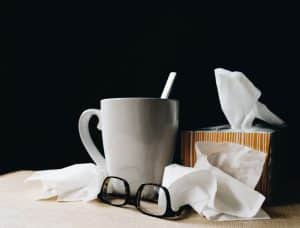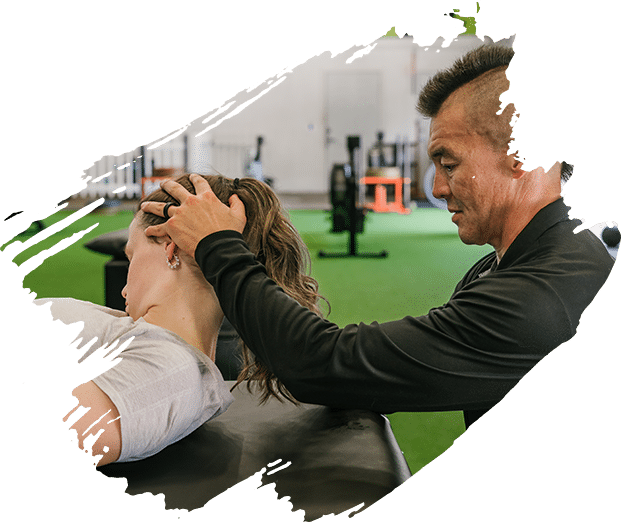GET STARTED NOW WITH A FREE STRETCH Therapy SESSION
- Relieve Stiffness & Soreness
- Enhance Athletic Performance
- Increase Range of Motion
- Improve Balance & Posture
 Many couples in Lakeland, FL join the gym together and then work out at different times. That might be a wasted opportunity. Sometimes, it's because of childcare, while other times it's simply scheduling convenience. Both are logical reasons, but why not take at least one day for time as a couple? Work out together and follow it with a healthy dinner out. It may cost more because of a sitter, but you can save money with semi-private training. You'll learn routines you can do at home together.
Many couples in Lakeland, FL join the gym together and then work out at different times. That might be a wasted opportunity. Sometimes, it's because of childcare, while other times it's simply scheduling convenience. Both are logical reasons, but why not take at least one day for time as a couple? Work out together and follow it with a healthy dinner out. It may cost more because of a sitter, but you can save money with semi-private training. You'll learn routines you can do at home together.
Walking, hiking, bike riding, and dancing are excellent types of exercise for couples. You can do other things besides weightlifting and calisthenics. Anything that gets you up and moving is good. Whether you walk the mall, jump rope, or turn up the music and dance together, you're getting exercise. It doesn't have to cost money or require a lot of equipment. Inexpensive children's toys like hula hoops, can be a fun couple's workout challenge.
Why not make that workout buddy your significant other? A partner can check your form, hold you accountable, and be part of the exercise. If you're doing sit-ups, your favorite person can sit on your legs to maximize the benefits. You don't need a piece of equipment to do it. Hook squats are fun, but you need a partner. Stand back to back and lock arms, then squat until your thighs are parallel to the ground. Sidestep in that position, making a complete circle clockwise, then switch and do the same thing counter-clockwise. You can even do wall squats together, using each other's backs as the wall.
Having a spouse or significant other as a workout partner can provide motivation. It can make your workout more effective and keep you working hard. It also can improve your relationship, but the opposite of all these things can also be true. Both parties should be dedicated to exercising together and sticking with the scheduled time. If one partner isn't, instead of keeping the other motivated, it can destroy motivation. There should be a reward for sticking with the program and a penalty for the person who skips it. The penalty can be chore-related. Scheduling the time and having rules to follow can help prevent problems.
For more information, contact us today at Habitat Health & Fitness
 Snacking is almost an American tradition. You see it in commercials and commonly on TV shows. If you started eating healthier, healthy snacks should also be on the menu. Sometimes, you want more. You want special treats that you used to eat before your dietary changes. You can still have them, but you must eat them in moderation and only occasionally. If weight loss is one of your goals, try to keep the portion size between 100-200 calories.
Snacking is almost an American tradition. You see it in commercials and commonly on TV shows. If you started eating healthier, healthy snacks should also be on the menu. Sometimes, you want more. You want special treats that you used to eat before your dietary changes. You can still have them, but you must eat them in moderation and only occasionally. If weight loss is one of your goals, try to keep the portion size between 100-200 calories.
Most treats people crave are not only high in calories but also unhealthy. They contain high amounts of sugar and often have no redeeming quality unless it's the pleasure you get when you eat them. Most contain high amounts of sugar, fat, and-or salt. They're created to make you want more. You can avoid over-eating by dividing larger sizes into 100 to 200-calorie portions and limiting yourself to one portion.
You can purchase individual bags of nuts, but most of them are highly salted and oil roasted. You're better off buying raw nuts and creating individual-sized bags. Walnuts, pistachios, and pecans are good choices. You can add pumpkin or sunflower seeds to your mix. For a little sweetness, add pieces of dried fruit or a small amount of dark chocolate.
People often miss their sweet treats when they switch to a healthier lifestyle. Sometime, that sweet apple or those grapes won't do. When you're at that point, consider angel food cake. One slice is just 72 calories. Top it with sliced strawberries or blueberries and 2 TBSP of non-fat topping for another 100 calories and you have a delectable dessert for under 200 calories. You could even sprinkle on a few shavings of dark chocolate.
For more information, contact us today at Habitat Health & Fitness
 You'll get huge benefits from outdoor exercise in the heat. It can boost your metabolism and improve exercise efficiency. You need to acclimate your body to the heat to let your body make adaptations. People in Lakeland, FL can do that by taking their workout outdoors a few days a week all year. As the weather slowly gets hotter, you'll adjust as the temperature rises. Exercising outside in the heat has its drawbacks. It can be dangerous if you're not in peak shape. People with health conditions, are older, or taking medications, should check with their healthcare professional first. Exercise smarter in the heat.
You'll get huge benefits from outdoor exercise in the heat. It can boost your metabolism and improve exercise efficiency. You need to acclimate your body to the heat to let your body make adaptations. People in Lakeland, FL can do that by taking their workout outdoors a few days a week all year. As the weather slowly gets hotter, you'll adjust as the temperature rises. Exercising outside in the heat has its drawbacks. It can be dangerous if you're not in peak shape. People with health conditions, are older, or taking medications, should check with their healthcare professional first. Exercise smarter in the heat.
Experience one of the many Lakeland bike paths in parks or the Lake-to-Lake bikeway system. You'll get exercise and a gorgeous view of the outdoors. Riding a bike or exercising outdoors has its benefits. It can help reduce chronic inflammation that can negatively affect all parts of your body. It also lowers your stress level and reduces cortisol which contributes to belly fat. The combination of sun, fresh air, and exercise can lift your spirits, too.
Just being around greenery improves your spirit. Take a walk in Hollis Garden and enjoy the greenery. Turn the walk into a HIIT---high intensity interval training---workout by modifying your pace. Walk or run at peak intensity for a minute or two, then reduce it to recovery for the same time or longer. Repeat throughout the walk. Take a hike in one of the many parks for a more challenging session. Colt Creek, Loyce Harp Park, and Gator Creek Reserve Trail are a few ideal places to hike to enjoy the outdoors as you exercise.
You'll get many benefits from exercising in the water. Your body is buoyant, so it's easier on the joints. You'll also be pushing against the resistance of the water, so simple movements burn more calories. You can choose from one of the many swimming pools in the city to do pool exercises. If you want more adventure, go kayaking or paddleboarding at Lake Crago Outdoor Recreation Complex or go to Colt Creek for canoeing and kayaking.
For more information, contact us today at Habitat Health & Fitness
 Why do personal trainers document your fitness progress every time you work with them? One reason is that it helps identify whether the program is working. The trainer can look at your beginning weight if weight loss is a goal and compare it to your present weight. He or she can compare the number of sets and repetitions you can do of a given exercise and see if there's an improvement. The trainer also knows that tracking your workouts and progress can help determine what to do next.
Why do personal trainers document your fitness progress every time you work with them? One reason is that it helps identify whether the program is working. The trainer can look at your beginning weight if weight loss is a goal and compare it to your present weight. He or she can compare the number of sets and repetitions you can do of a given exercise and see if there's an improvement. The trainer also knows that tracking your workouts and progress can help determine what to do next.
Some people enter a fitness program for reasons other than building more muscle and shedding fat. Some want to improve athletic performance, while others just want to manage a condition, like high blood pressure or insulin resistance. You need to document the signs that are vital to your goal. If you want to build muscle and lose fat, track your weight and measurements. If you want to be healthier, track blood pressure, blood sugar levels, or other factors regarding your health. If you're working out to build strength, track the amount you can lift and for tracking endurance, track miles run, stairs climbed, or heart rate.
When you write down a workout, you can do it quicker and not stop to remember what to do next. You can see the progress you have made. Getting fit takes a while and occurs in small increments. You might not realize how far you've come. Documentation can create a picture of your journey. Looking back at your progress can provide inspiration to continue when your motivation is dragging.
If you're competitive, especially with yourself, documenting your progress helps. Most competitive people strive to outdo their last workout when they track and achieve or surpass their daily goal. Tracking your progress also holds you accountable. You may think you're getting fitter and doing more, but the numbers don't lie. They can prove it one way or the other. Documenting your journey helps keep you focused on your goals.
For more information, contact us today at Habitat Health & Fitness
 We do team training at Habitat Health and Fitness in Lakeland, FL, so we work with many athletes. We also believe that inside every person is a hidden athlete waiting to emerge. Clients often wonder if plant-based diets could fit into an active, athletic lifestyle. The answer is yes, but it takes a lot of planning to ensure it contains all the nutrients necessary. There are as many ways to go plant-based as there are people. Each diet should be individualized and healthy.
We do team training at Habitat Health and Fitness in Lakeland, FL, so we work with many athletes. We also believe that inside every person is a hidden athlete waiting to emerge. Clients often wonder if plant-based diets could fit into an active, athletic lifestyle. The answer is yes, but it takes a lot of planning to ensure it contains all the nutrients necessary. There are as many ways to go plant-based as there are people. Each diet should be individualized and healthy.
The answer is no. A plant-based diet could include animal products, such as eggs, milk, fish, and meat, but on a more limited basis. It could include fish, but not red meat or poultry. No matter what type of plant-based diet that's chosen, ensuring the food is healthy is the primary goal. Even if you're eating a plant-based diet, if it contains white bread, French fries, and highly processed snack food, you won't perform as well or get the health benefits you desire.
The more rigid the plant-based diet, the more potential there is for too little iron and vitamin B12. People on vegan diets may lack calcium and need to know how to balance plant protein to ensure they get all essential amino acids daily. Including a variety of plant protein sources helps solve the problem with amino acids. To increase iron, focus on legumes, nuts, and dark green leafy vegetables. You need iron and B12 to deliver oxygen to the muscles. B12 is in nutritional yeast and fortified foods. Calcium is in milk products, but if those aren't part of the personalized diet, collard greens, kale, fortified products, and bok choy are also rich in calcium.
Athletes are choosing to eat more vegetables and cut back on meat. Some don't call it plant-based, just plant-focused. Why do they do it? It can promote weight loss to help you reach and maintain your healthiest weight. Many people say it increases their energy level and boosts their performance. It's why many collegiate and professional athletes choose a plant-based option. It can help lower blood pressure, reduce inflammation, improve your cholesterol profile, and improve digestion.
For more information, contact us today at Habitat Health & Fitness
 The hot weather of summer should remind everyone to stay hydrated. Unfortunately, it doesn't always happen. In warmer weather, you sweat more. Unless you replace the lost liquid, it doesn't take long before you start to notice the symptoms of dehydration. Thirst is the first sign of dehydration, but not all people notice their thirst. Some think they're hungry when in reality, they're thirsty. Dark-colored urine, headache, nausea, fatigue, confusion, and dizziness are other signs of dehydration. You don't have to wait for the signs to appear if you carry water with you and sip on it frequently. It's one way to stay hydrated.
The hot weather of summer should remind everyone to stay hydrated. Unfortunately, it doesn't always happen. In warmer weather, you sweat more. Unless you replace the lost liquid, it doesn't take long before you start to notice the symptoms of dehydration. Thirst is the first sign of dehydration, but not all people notice their thirst. Some think they're hungry when in reality, they're thirsty. Dark-colored urine, headache, nausea, fatigue, confusion, and dizziness are other signs of dehydration. You don't have to wait for the signs to appear if you carry water with you and sip on it frequently. It's one way to stay hydrated.
While other liquids and even juicy fruits can keep you hydrated, drinking water is best. Coffee and tea contain caffeine that acts as a diuretic, so you'll void more frequently. That can create a net sum of zero added fluid. Soft drinks also contain caffeine and high amounts of sugar or sugar substitutes. Sugar adds pounds, while artificial sweeteners can increase your waist circumference and add belly fat. If you don't like plain water, try infused water. It's water lightly flavored with fruit, herbs, or vegetables. Slice the fruit or vegetable or crush the herbs and put them in the water, let it remain for two hours, then remove and refrigerate. It has the essence of fruit, vegetable, or herb, but with no calories.
There are phone apps that will remind you to drink, track your liquid intake, and provide rewards for reaching your goal. You can set your phone alarm to ring periodically to remind you to drink more water. Develop a schedule and create a habit of drinking more water. Make your schedule coordinate with your day. If you take a break at ten, drink a glass of water. You can even tie it into your restroom break. Think of it as an empty followed by a refill.
Understanding the benefits of water can help you drink more. Drinking more water can help you lose weight. Studies show if you drink a glass of water before a meal, you'll eat less. It also helps you burn more calories by providing energy and boosting your metabolism. Consider water, your magic elixir that is the quicker-picker-upper. It outshines coffee in most cases. If you're fatigued, you may just be mildly dehydrated. Try a glass of water before getting a cup of coffee.
For more information, contact us today at Habitat Health & Fitness
 People working out at Habitat Health and Fitness know it takes more than just exercise to achieve their goals. It also takes a healthy diet. A healthy diet should include all macronutrients, including carbohydrates. Carbs get a bad rap. They're blamed for weight gain and various maladies. Not all carbohydrates are bad. Some provide health benefits you can't get any other way. The carbohydrate category is broad and includes both healthy foods like vegetables and fruit, and unhealthy ones like sugar and highly processed food.
People working out at Habitat Health and Fitness know it takes more than just exercise to achieve their goals. It also takes a healthy diet. A healthy diet should include all macronutrients, including carbohydrates. Carbs get a bad rap. They're blamed for weight gain and various maladies. Not all carbohydrates are bad. Some provide health benefits you can't get any other way. The carbohydrate category is broad and includes both healthy foods like vegetables and fruit, and unhealthy ones like sugar and highly processed food.
Carbohydrates are one of the three categories of macronutrients. It's one of three categories, with the other two being protein and fat. broad. It includes starch, sugar, and fiber. Carbohydrates provide the body with energy. There are simple and complex carbohydrates. Simple carbs digest rapidly and spike the blood sugar. Complex carbs take longer to digest. Carbs can be fiber. There are two types of it, soluble and insoluble. Soluble fiber bonds with water creating a gel. The gel not only adds moisture to excrement to make it easier to pass, but it also feeds the microbes in the gut that keep us healthy. Insoluble fiber doesn't digest but adds bulk to the stool.
Fruits and vegetables are carbohydrates, and so are whole grains. Those are healthy foods. They contain fiber and other nutrients like vitamins and minerals. Highly processed foods and foods with added sugar are also carbohydrates, but they have no nutrients. They only provide energy---calories. They digest quickly, so they cause a spike in blood glucose and an increase in insulin. When that happens too often, it can cause insulin resistance, obesity, and other problems.
Eating too many of the wrong types of carbohydrates is unhealthy. That doesn't make all carbohydrates bad. You'll find many of the healthy carbs in the produce section of the grocery. These foods contain fiber, starch, and nutrients. Fiber prevents blood sugar from spiking by slowing sugar absorption. It feeds beneficial bacteria. Whole grains also contain fiber and other nutrients. All foods with fiber fill you up quickly and keep you feeling full longer, so they aid in weight loss. To be your healthiest, you need carbs in your diet, but they must be healthy carbs.
For more information, contact us today at Habitat Health & Fitness
 When people opt for low-carb diets, they hope the side effects will be weight loss. In many cases, they're right. Low-carb diets also have some negative side effects that range from uncomfortable to painful. Low-carb diets are designed to reduce the number of calories from carbs and increase calories from protein and fat. When you limit carbs, you limit sugary and refined products are removed from the diet. That alone can make a difference in overall good health and weight loss, and it's a positive difference. What are some of the negative side effects people experience?
When people opt for low-carb diets, they hope the side effects will be weight loss. In many cases, they're right. Low-carb diets also have some negative side effects that range from uncomfortable to painful. Low-carb diets are designed to reduce the number of calories from carbs and increase calories from protein and fat. When you limit carbs, you limit sugary and refined products are removed from the diet. That alone can make a difference in overall good health and weight loss, and it's a positive difference. What are some of the negative side effects people experience?
When you start a low-carb diet, particularly one that's extremely low in carbs, like a keto diet, you get flu-like symptoms. It starts in the first few days and can last a week or more. It has flu symptoms, like feeling exhausted, experiencing nausea, and sometimes feeling mentally disoriented and confused. A few people have symptoms of hypoglycemia---low blood sugar. It occurs after the body uses all the glucose and glucose stores, but still requires energy. It then breaks down fat to produce ketones for fuel. When there are no carbs in the system, insulin is reduced, which causes a release of water, sodium, and potassium. It can also cause the brain to have less fuel for a while, hence the brain fog.
What happens when you don't have enough fiber in your diet? You get constipated. Not only does a low-carb diet create dietary changes that can usher in difficulties in the bathroom, but it also reduces the fiber in your diet. Low-carb diets reduce the amount of grain and other high-fiber foods, like beans. That lack of fiber causes constipation. When choosing carbs, choose food that provides fiber.
Bad breath can be a big side effect of a strict low-carb diet, primarily the keto diet. When your body switches from using glucose to using ketones for food, acetone is produced. It is removed through urination or exhalation. It causes the breath to smell like nail polish remover, sickeningly sweet, or worse due to other by-products also exiting the body. No amount of brushing, flossing, or gargling can remove the smell.
For more information, contact us today at Habitat Health & Fitness
 Most people in Lakeland, FL, can identify some food that doesn't agree with them. A few live in fear because their reaction could be life-threatening. That's one explanation of the difference between a food allergy and a food sensitivity, or intolerance. It's how the body responds to the food and what triggers the reaction. The immune system triggers a food allergy. Food sensitivity, or intolerance, is triggered by the digestive system.
Most people in Lakeland, FL, can identify some food that doesn't agree with them. A few live in fear because their reaction could be life-threatening. That's one explanation of the difference between a food allergy and a food sensitivity, or intolerance. It's how the body responds to the food and what triggers the reaction. The immune system triggers a food allergy. Food sensitivity, or intolerance, is triggered by the digestive system.
People with sensitivities to food don't face life-threatening consequences. Their belly may bloat with gas, but their face and airways won't swell. All the action takes place in the digestive tract. If you're lactose intolerant, you can't process the sugar, which is lactose in dairy. Your body doesn't create the enzymes, or creates less than required, to digest the food. The result is that the dairy fails to digest in the small intestines, or only partially digests, and the watery undigested lactose moves to the colon. It ferments there and causes bloating, pain, and gas.
The immune response to the body's foreign invaders is beneficial when the invader is a virus, bacteria, or fungus, but can be deadly if the body mistakes a specific food protein for an invader. It can trigger similar reactions, and produce antibodies to attack it, releasing chemicals into the system. In rare, but extreme cases, just touching the food can create a dangerous reaction. Breathing difficulties, digestive issues, and skin conditions like hives or swelling can occur.
Food that's difficult to digest for some people due to enzymes includes dairy, due to too little lactase, the enzyme that breaks it down. It includes the inability to break down histamines in food like pineapples, cheese, bananas, chocolate, and avocados. Gluten is another protein the body may have difficulty digesting, just as food additives or preservatives are. People can be sensitive to naturally occurring chemicals or sugars, caffeine is one chemical example, and an onion is an example of a sugar. Some of the same foods are responsible for allergies. Eight foods are responsible for 90% of food allergies. They include milk, fish, shellfish, peanuts, tree nuts, and soybeans.
For more information, contact us today at Habitat Health & Fitness
